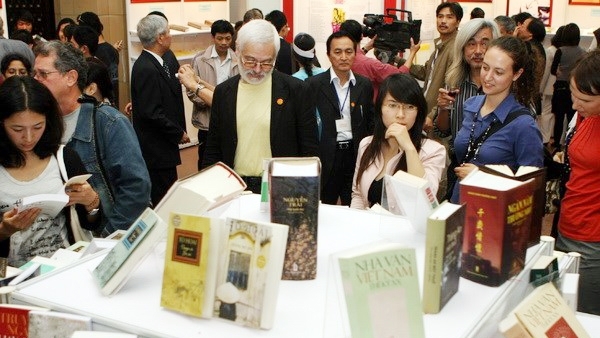
Visitors at a book fair on Vietnamese literature
Over the past few years, thanks to the huge efforts of authors and publishing houses, a number of Vietnamese literary works have been promoted on the world market. In addition to celebrated writers, international readers are now updated on contemporary authors such as Bao Ninh, Nguyen Huy Thiep, Nguyen Nhat Anh, Ho Anh Thai, and Nguyen Ngoc Tuan.
Among them, Nguyen Nhat Anh is the Vietnamese writer whose books have been released in the most foreign countries, who has generated an enthusiastic response with his novel named ‘Cho Toi Xin Mot Ve Di Tuoi Tho’ (Give me a ticket back to Childhood).
Meanwhile, poet Mai Van Phan emerged as a “phenomenon” as up to five of his poem collections have been introduced globally thanks to the support of a UK-based publishing house. His collections were among the top ten of the 100 best-selling poetry collections from Asia on Amazon.
In addition to the individual efforts made by the authors, Vietnamese publishing houses have also actively become involved in attaining a position for Vietnamese literature on the world’s bookcase.
Kim Dong Publishing House has released a number of bilingual books in Vietnamese-English and Vietnamese-French, targeting Overseas Vietnamese communities abroad. Tre (Youth) Publishing House has actively coordinated with international online bookstores to bring best-selling Vietnamese publications to the world.
However, the number of Vietnamese literary works which have reached beyond the country’s border remains modest. Publishing houses have worked individually without coordinating with others or receiving proper support from the State.
They have faced difficulties in seeking authors and translators, calling for investment, and finding markets for book launches. Even payment methods while working with international partners also leads to problems since the current regulations on taxation and finance have not yet facilitated the book business in foreign markets.
In Vietnam, a literary work is normally printed in 1,000 copies in its first publication. For those that are predicted to attract great interest from readers, the figure can be up to 2,000. When the number reaches 5,000 or even 10,000, it is absolutely a “phenomenon” in the market.
However, in Vietnam, a country with a population of more than 80 million, 1,000 copies is a very small number, which can not convince the international book distributors about the attraction of the authors and the books to readers. Consequently, they may hesitate to make investment on the deal.
Therefore, in addition to further investment in PR campaigns to advertise books, it is also important to call on greater support from domestic readers to literary works in a bid to effectively popularise Vietnamese literature in order to reach the global market./.
NDO
 Preserving and spreading cultural values through each heritage
Preserving and spreading cultural values through each heritage



